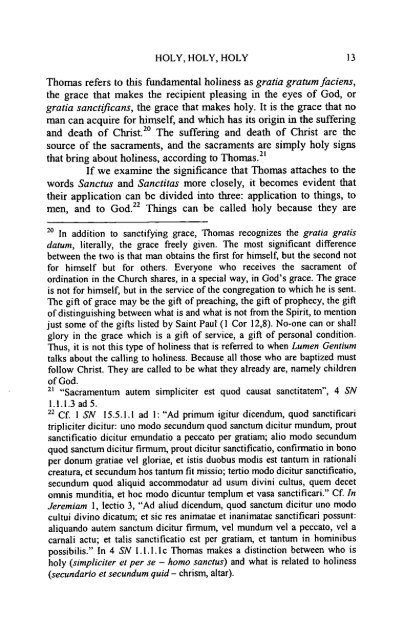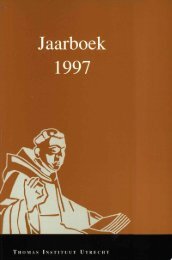Jaarboek Thomas Instituut 2006 - Thomas Instituut te Utrecht
Jaarboek Thomas Instituut 2006 - Thomas Instituut te Utrecht
Jaarboek Thomas Instituut 2006 - Thomas Instituut te Utrecht
You also want an ePaper? Increase the reach of your titles
YUMPU automatically turns print PDFs into web optimized ePapers that Google loves.
HOLY, HOLY, HOLY 13<br />
<strong>Thomas</strong> refers to this fundamental holiness as gratia gratum faciens,<br />
the grace that makes the recipient pleasing in the eyes of God, or<br />
gratia sanctificans, the grace that makes holy. It is the grace that no<br />
man can acquire for himself, and which has its origin in the suffering<br />
and death of Christ. 20 The suffering and death of Christ are the<br />
source of the sacraments, and the sacraments are simply holy signs<br />
that bring about holiness, according to <strong>Thomas</strong>.21<br />
If we examine the significance that <strong>Thomas</strong> attaches to the<br />
words Sanctus and Sanctitas more closely, it becomes evident that<br />
their application can be divided into three: application to things, to<br />
men, and to God.22 Things can be called holy because they are<br />
20 In addition to sanctifying grace, <strong>Thomas</strong> recognizes the gratia gratis<br />
datum, li<strong>te</strong>rally, the grace freely given. The most significant difference<br />
between the two is that man obtains the first for himself, but the second not<br />
for himself but for others. Everyone who receives the sacrament of<br />
ordination in the Church shares, in a special way, in God's grace. The grace<br />
is not for himself, but in the service of the congregation to which he is sent.<br />
The gift of grace may be the gift of preaching, the gift of prophecy, the gift<br />
of distinguishing between what is and what is not from the Spirit, to mention<br />
just some of the gifts lis<strong>te</strong>d by Saint Paul (I Cor 12,8). No-one can or shall<br />
glory in the grace which is a gift of service, a gift of personal condition.<br />
Thus, it is not this type of holiness that is referred to when Lumen Gentium<br />
talks about the calling to holiness. Because all those who are baptized must<br />
follow Christ. They are called to be what they already are, namely children<br />
of God.<br />
21 "Sacramentum au<strong>te</strong>m simplici<strong>te</strong>r est quod causat sanctita<strong>te</strong>m", 4 SN<br />
1.1.1.3 ad 5.<br />
22 Cf. I SN 15.5.1.1 ad I: "Ad primum igitur dicendum, quod sanctificari<br />
triplici<strong>te</strong>r dicitur: uno modo secundum quod sanctum dicitur mundum, prout<br />
sanctificatio dicitur emundatio a peccato per gratiam; alio modo secundum<br />
quod sanctum dicitur firrnum, prout dicitur sanctificatio, confirrnatio in bono<br />
per donurn gratiae vel gloriae, et istis duobus modis est tantum in rationali<br />
creatura, et secundum hos tantum fit missio; <strong>te</strong>rtio modo dicitur sanctificatio,<br />
secundum quod aliquid accommodatur ad usum divini cultus, quem decet<br />
omnis munditia, et hoc modo dicuntur <strong>te</strong>mplum et vasa sanctificari." Cf. In<br />
Jeremiam I, lectio 3, "Ad aliud dicendum, quod sanctum dicitur uno modo<br />
cultui divino dicatum; et sic res animatae et inanimatae sanctificari possunt:<br />
aliquando au<strong>te</strong>m sanctum dicitur firrnum, vel mundum vel a peccato, vel a<br />
camali actu; et talis sanctificatio est per gratiam, et tantum in hominibus<br />
possibilis." In 4 SN I.l.l.Ic <strong>Thomas</strong> makes a distinction between who is<br />
holy (simplici<strong>te</strong>r et per se - homo sanctus) and what is rela<strong>te</strong>d to holiness<br />
(secundario et secundum quid - chrism, altar).








